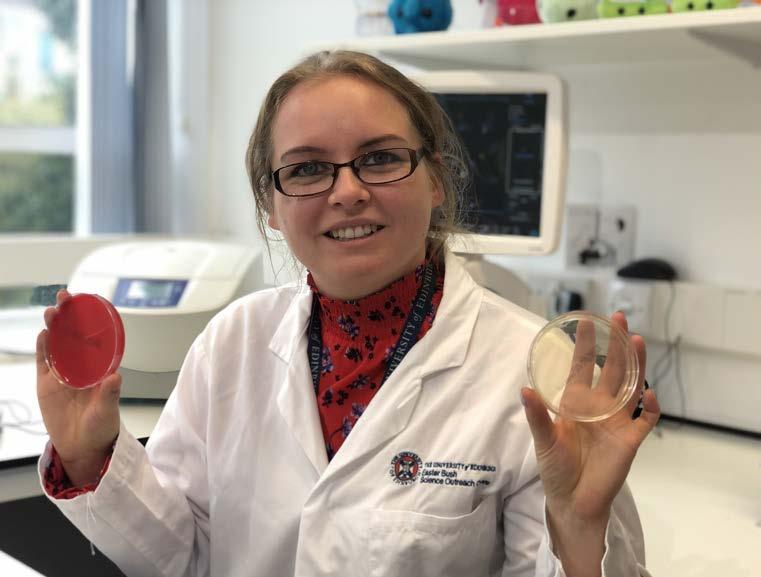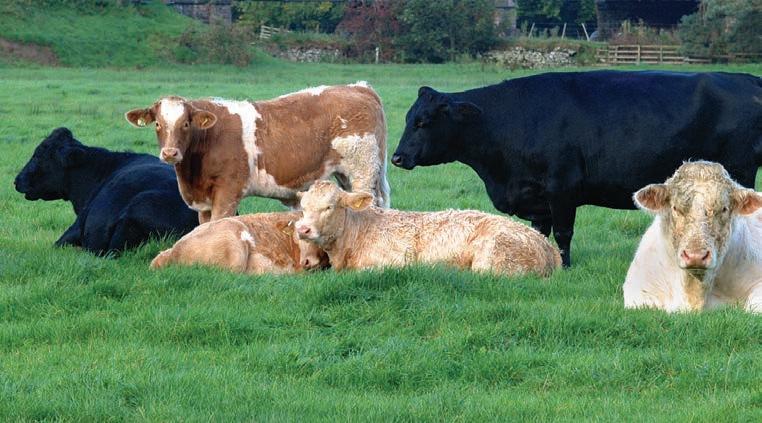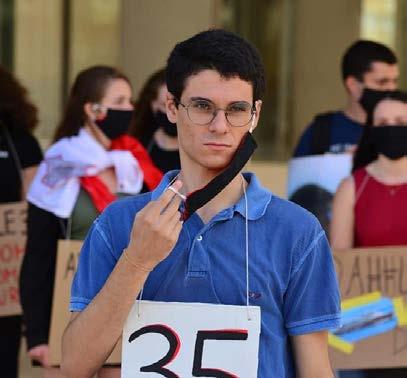
7 minute read
Jan EBSOC scheme puts pupils in touch with scientists
by thedickvet
Public Engagement Online scheme puts pupils in touch with scientists
Almost 2,500 pupils from across Scotland have benefited from an online scheme in which they can meet scientists and learn about their work.
Advertisement
Some 13 scientists at the Roslin Institute have participated in the popular programme, Meet A Roslin Scientist, aimed at pupils from P6 to S6 and hosted by the Easter Bush Science Outreach Centre (EBSOC).
The sessions give school pupils the opportunity to learn about the work of scientists and give insight into careers in science.
Pupils submit questions beforehand and can ask additional questions during the 40-minute sessions, which include a live demonstration.
Schools events would normally take place at EBSOC, with school classes travelling to the campus, taking part in a practical workshop and speaking to scientists in person.
Due to Covid-19, schools now engage virtually, which has allowed EBSOC events to reach pupils in 21 of the 32 local authority areas in Scotland.
The online format has enabled access for schools which are in rural areas or far from Edinburgh and for multiple classes to participate in a session.
Pupils read the scientist’s profile, watch a short video and submit questions before the sessions and a live video feed allows students to see scientists demonstrate practical and computational work linked to their research.
The sessions offer scientists a chance to build skills in public engagement, and to communicate about their research to a bigger audience.
“Meet a Roslin Scientist has enabled us to connect schools with real-life research at the Roslin Institute, despite the current restrictions, and that it has also extended the reach of our engagement programme across Scotland has been a wonderful bonus. Online engagement is here to stay for the Easter Bush Science Outreach Centre!” - Dr Nicola Stock, Public Engagement with Research Manager, Roslin Institute. “It would be great to keep online sessions in the future, our school is in the Highlands and we would never be able to visit the Easter Bush Science Outreach Centre. Our pupils were very engaged throughout the session and it helped ignite a spark in science in them.”
COP26 Research helps lower emissions from animal farming
The Roslin Institute’s work supports the aims of the United Nations Conference of the Parties (COP26) by enabling sustainable livestock production and improved animal health and welfare, while reducing the climate impact of farming in the UK and internationally.
Roslin scientists are using world-leading research and knowledge translation to develop scientific, technical, and systematic solutions that will help achieve UN Sustainable Development Goals including zero hunger, while also helping decrease carbon emissions from farmed animal production.
Roslin’s commitment is set out in our statement on sustainability and net zero, available on our website.
Scientific developments that reduce the environmental impact of livestock are needed at a time when meat and dairy consumption is growing year-on-year.
Roslin’s research aims to help the farmed animal food system achieve net zero emissions without compromising global and national food and economic security, animal welfare or the eco-system.
Advanced breeding, supported by genetics expertise and technology, reduces the climate impact of livestock by generating efficiencies throughout meat and dairy production.
Our world-leading research programmes target enabling the production of more food using fewer resources and fewer animals, enhancing welfare, and reducing losses to disease. Breeding more efficient animals, which use fewer resources, such as land, water, and feed, directly reduces the carbon footprint of livestock farming.
Selective breeding in farming has enabled improved efficiency in recent decades, to maintain the same production levels with fewer animals, and so reducing the environmental impact. Further benefits to sustainable livestock can be achieved through genome editing. We work with animal breeding companies to introduce precise changes to animal genomes that bring about beneficial changes, such as disease resistance, leading to higher animal welfare and a reduced carbon footprint.
Roslin expertise includes developing ways to control infectious disease and keep livestock healthy, which reduces losses and improves sustainability of the sector.
Our research ranges from genetic tools to breed animals that can withstand infections, to developing vaccines and diagnostics, and datadriven tools to predict disease spread and aid decision-making.
Researchers at Roslin are studying DNA of the microbes in cattle stomachs, to develop animals that produce lower levels of the potent greenhouse gas methane, so cutting emissions from one of its largest man-made sources.
Roslin is a world leader in applying genomic technologies to improve fish and seafood farming, which is the fastest growing food production sector, with benefits including nutritional products and a low carbon footprint. Meanwhile, the Centre for Tropical Livestock Genetics and Health, a joint centre with our partners SRUC and ILRI, seeks to remove losses due to disease and improve livestock food production in tropical countries, with a major focus in Africa. Doing so will significantly improve the sustainability of livestock, and so reduce their carbon footprint.
Elsewhere, our scientists are working with industry partners to develop insect animal feed as a low-carbon, protein-rich alternative to soya feed.
“The climate crisis is one of the greatest problems humanity has faced, and we welcome the UK Government’s commitments as part of a global strategy to reduce greenhouse gas emissions and rising global temperatures. Roslin’s research aims to make livestock production more efficient, while safeguarding health and welfare for animals, which could help meet the rising demand for food in a sustainable manner.” - Professor Mick Watson, Personal Chair of Bioinformatics and Computational Biology, Roslin Institute.


Student joins international COP26 youth event
An undergraduate student has joined a United Nations event for young people ahead of the COP26 climate change summit.
Xandru Cassar, a third-year BSc in Agricultural Economics student, represented his home nation of Malta at the Youth4Climate Summit in Milan.
Mr Cassar was one of 400 young delegates representing nations around the world at the pre-COP26 gathering, at which young people were tasked with developing and presenting their proposals for tackling climate change. He and other delegates met and took part in preparations via an online forum for several months, before meeting in Italy.
Their conference in Milan comprised three full days of meetings and activities, including the opportunity to meet delegates from around the world, together with prime ministers and foreign ministers.
“Much of what I’ve heard and experienced at the Youth Summit will remain with me ... however, meeting people from all over the world, with so many walks of life and experiences represented, will remain with me much more than the hard documents we worked on together.” - Xandru Cassar, BSc Agricultural Economics student.

Balloon blow-up helps pupils learn climate science
More than 3,000 primary school children will be blowing up balloons in a hands-on science investigation that will teach them about the role of microorganisms in climate change.
The Big Balloon Blow-Up activity, organised by the Roslin Public Engagement team to coincide with COP26, is designed to encourage pupils to explore the production of carbon dioxide, and relate this to research by Roslin scientists into gut microorganisms in cattle that produce greenhouse gases.
A Roslin team also took part in public engagement at the UKRI stand at COP26, talking to visitors about their work that aims to keep farmed and wild oysters healthy.
Expert joins sustainable livestock event at COP26
A scientist whose work on sustainable livestock production has influenced government policy in Brazil joined a highprofile event at COP26.
Dr Rafael Silva, a Chancellor’s Fellow in the Global Academy of Agriculture and Food Security, took part in a Sustainable Livestock panel in Brazil’s Pavilion.
In this panel, government representatives and farmers discussed promotion and adoption of low carbon emission technologies.
Dr Silva’s expertise is in applied mathematics, working with models of agriculture, food security and biodiversity conservation, to better understand the relationships between energy, livestock and deforestation. His work has previously informed policy. At the meeting in Glasgow, Dr Silva gave scientific advice to support discussions on sustainable intensification routes, and the evaluation of the success and the future of ongoing agricultural programmes.
Brazil faces the challenge of reconciling international commitments on greenhouse gases, biodiversity conservation and maintaining economic growth in the agricultural sector through meeting global beef demand. This is taking place as other countries support reduced red meat consumption.
Lessons from India on scaling up natural farming
Learnings from a large-scale organic farming programme were discussed at an event at COP26.
Speakers shared their experience of the sustainable agriculture operation, implemented by the government of Andhra Pradesh in India, which aims to transform 6 million farms on 8 million hectares of land in the southern state into natural farming by 2030.
The project is the world’s largest agroecology programme – that is, sustainable farming that works with nature. Agroecology has been welcomed by the UN Food and Agriculture Organization as helpful to governments in making progress on achieving global targets for climate change, biodiversity, nutrition, and postCovid economic development.
Panellists from the UK and India took part in the event, held as part of the ‘Recipes for resilience: the food and climate zone’ programme at COP26, organised by Nourish Scotland.








